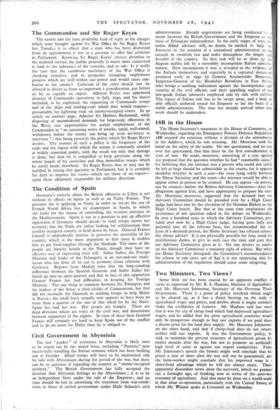Civil Government in- Abyssinia
The last " pocket " of resistance in Abyssinia is likely soon to be wiped out by the mixed force, including " Patriots," now successfully handling- the Italian remnant which has been holding out at Gondar. Allied troops will have to be maintained side by side with Abyssinians during the period of the war, but there can be no question of regarding the country as " enemy-occupied territory." The British Government has fully accepted the doctrine that Abyssinia belongs to the Abyssinians ; it is to -be an independent State under the rule of the Emperor ; and no time should be lost in smoothing the transition from war-condi- tions to those of settled government under Haile Selassie's civil
administration. Already negotiations are being conducted for a treaty between the British Government and the Emperor on the basis of Ethiopian independence. In the early stages of reorgani- sation Allied advisers will, no doubt, be needed to help the Emperor in the creation of a centralised administration strong enough to establish law -and order throughout the length and breadth of the country. Its first task will be to clean up the Augean stables left by m miserably incompetent Italian adminis- tration. How incompetent it was •is revealed -in the evidence of the Italians themselves, and especially in a captured document prepared early in 1940 by General Arconovaldo Bonacorsi, Inspector-General of the Blackshirt Battalions in East Africa, who -brings a scathing indictment against the incompetence and venality of the civil officials and their appalling neglect of the low-grade Italian labourers employed side by side with natives. The legacy of Italian rule has to be swept away, and a body of able officials gathered round the Emperor to lay the basis of a stable administration. The time has already arrived when that work should be undertaken.


























 Previous page
Previous page